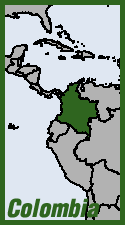 With foreign capital pouring into Colombia's newly legalized cannabis sector, industry leaders foresee the country becoming the world leader in production and exports—a new "Saudi Arabia of cannabis." However, traditional peasant producers fear they will not have access to the legal market—but will continue to face repression and eradication. The newly formed National Coordinator of Coca, Poppy and Marijuana Cultivators is demanding a place for campesino producers in the new legal cannabis economy, and a halt to forced eradication efforts.
With foreign capital pouring into Colombia's newly legalized cannabis sector, industry leaders foresee the country becoming the world leader in production and exports—a new "Saudi Arabia of cannabis." However, traditional peasant producers fear they will not have access to the legal market—but will continue to face repression and eradication. The newly formed National Coordinator of Coca, Poppy and Marijuana Cultivators is demanding a place for campesino producers in the new legal cannabis economy, and a halt to forced eradication efforts.

 Turned down by the British government when they requested permission to use cannabis oil, the family of a child epilepsy sufferer personally delivered a petition with thousands of signatures to 10 Downing Street. They were backed up by members of parliament and the famous actor Sir Patrick Stewart. Charges of hypocrisy on the part of government were brought into sharp focus by revelations that the Home Office minister—ultimately responsible for the decision to turn down the request—is married to a businessman who oversees massive cultivation under contract to GW Pharmaceuticals.
Turned down by the British government when they requested permission to use cannabis oil, the family of a child epilepsy sufferer personally delivered a petition with thousands of signatures to 10 Downing Street. They were backed up by members of parliament and the famous actor Sir Patrick Stewart. Charges of hypocrisy on the part of government were brought into sharp focus by revelations that the Home Office minister—ultimately responsible for the decision to turn down the request—is married to a businessman who oversees massive cultivation under contract to GW Pharmaceuticals. A British Columbia firm which is one of Canada's leading licensed producers of medical marijuana has entered a partnership with the national subsidiary of Sandoz, a global leader in the pharmaceutical industry. The deal is being hailed as a milestone that signals the arrival of cannabis in the corporate economy.
A British Columbia firm which is one of Canada's leading licensed producers of medical marijuana has entered a partnership with the national subsidiary of Sandoz, a global leader in the pharmaceutical industry. The deal is being hailed as a milestone that signals the arrival of cannabis in the corporate economy. Several bills now pending before the Colorado state house will further shape what the legal cannabis economy will look like in the Centennial State—for better or for worse. While some of these measures would mean a freer atmosphere both for "recreational" and medicinal users, others may portend greater big-money control of the fast-growing industry.
Several bills now pending before the Colorado state house will further shape what the legal cannabis economy will look like in the Centennial State—for better or for worse. While some of these measures would mean a freer atmosphere both for "recreational" and medicinal users, others may portend greater big-money control of the fast-growing industry. Amid legal challenges and disputes over zoning in Detroit, Michigan's long-awaited regulatory regime for cannabis dispensaries continues to face obstacles to implementation. This has left hundreds of dispensaries operating in a "gray market"—tolerated by the authorities on an unofficial basis while the mess is being worked out. But now state authorities have started to order these outlets closed—potentially leaving thousands of registered users without access to their medicine.
Amid legal challenges and disputes over zoning in Detroit, Michigan's long-awaited regulatory regime for cannabis dispensaries continues to face obstacles to implementation. This has left hundreds of dispensaries operating in a "gray market"—tolerated by the authorities on an unofficial basis while the mess is being worked out. But now state authorities have started to order these outlets closed—potentially leaving thousands of registered users without access to their medicine. Seniors are the fastest growing group of medicinal cannabis users in the country, and a growing number of nursing homes from coast to coast are tolerating use of tinctures and extracts to combat dementia, insomnia and related ailments. Patient testimony is now backed up by research, with scientists identifying the mechanism by which cannabinoids slow the deterioration of neurons in the brain. But federal strictures continue to pose an obstacle to investigation—leaving medicinal users in the cold under US law.
Seniors are the fastest growing group of medicinal cannabis users in the country, and a growing number of nursing homes from coast to coast are tolerating use of tinctures and extracts to combat dementia, insomnia and related ailments. Patient testimony is now backed up by research, with scientists identifying the mechanism by which cannabinoids slow the deterioration of neurons in the brain. But federal strictures continue to pose an obstacle to investigation—leaving medicinal users in the cold under US law. Oakland-based cannabis industry research firm
Oakland-based cannabis industry research firm 





Recent comments
2 weeks 4 days ago
2 weeks 4 days ago
5 weeks 5 days ago
6 weeks 4 days ago
10 weeks 5 days ago
14 weeks 3 days ago
18 weeks 3 days ago
19 weeks 2 days ago
29 weeks 2 days ago
33 weeks 2 days ago